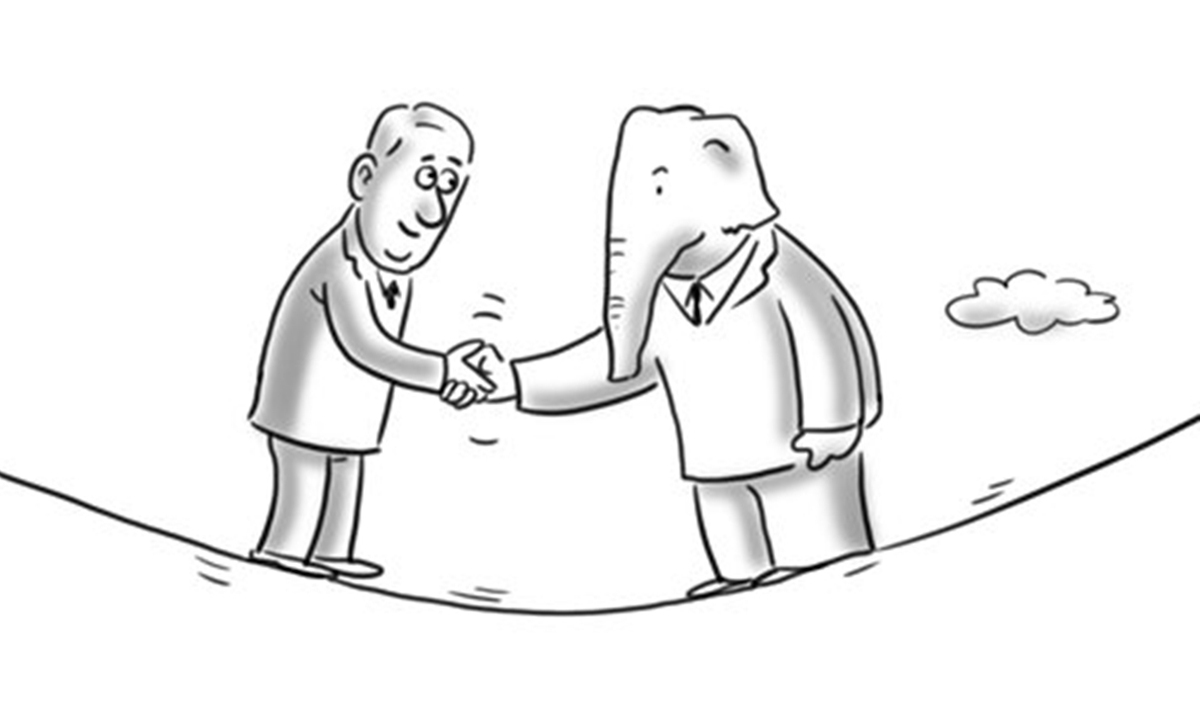Hard for India, Japan to form a united front against China
By Qian Feng Source: Global Times Published: 2020/8/20 21:38:40

Illustration: Liu Rui/GT
Indian Prime Minister Narendra Modi and Japanese Prime Minister Shinzo Abe will hold a virtual summit in early September, according to a Hindustan Times' report on Monday. The two leaders will, "not only discuss the Chinese aggression in Ladakh and the South China Sea but also cement the concept of Quad," namely the US, Japan, India and Australia, the report said.Against the backdrop of China-India border clashes and China-Japan disputes over the Diaoyu Islands, New Delhi may want to rope in Tokyo to jointly exert pressure on Beijing. Hence, it will increase its bargaining chips in the dispute with China to force it to make concessions on the border issue.
India and Japan were previously planning to hold the summit in October. But now, the two leaders will hold it in early September. This shows the tremendous interest both sides have for the summit to be held as soon as possible. During the summit, the two leaders are expected to sign the Acquisition and Cross Servicing Agreement (ACSA). This is a key military logistic pact that allows the Indian military and the Japan Self Defense Force to use each other's bases for logistical support.
India and Japan have been recently moving closer to each other in national defense, diplomacy and strategy. The ACSA will promote the communication between their defense forces, and increase joint training and equipment R&D.
The two countries are both important members of the US-initiated Indo-Pacific Strategy and Quad. Unlike relations between China and India or China and Japan, India and Japan had no historical issues or major geopolitical conflicts. The two countries have achieved rapid development in defense and security cooperation.
Modi and Abe will reportedly discuss China-India border clashes and disputes in the South China Sea. It seems the two countries intend to join hands on issues of their concern. However, it is more likely that India and Japan want to build momentum through the upcoming summit to form a common position and pressure China. However, it is unlikely that they will make substantial moves against China after the summit.
This is because China-India and China-Japan relations have not declined as rapidly as China-US relations have. Although New Delhi wants to add pressure on Beijing, solving China-India disputes through negotiations is still a general trend. As for Japan, it may still want to stabilize relations with China considering its economic development in the post-pandemic era. This being the case, New Delhi and Tokyo may not use extreme rhetoric and actions to provoke Beijing.
After the border clash, India has undertaken unilateral and unreasonable acts, trying to make China feel the heat. For example, India banned 59 Chinese mobile applications including TikTok and WeChat amid the border row. India has also tried to rope in Japan and Australia to rein China in. However, this will not help India's economic recovery or development in the post-pandemic era. By trying to hurt China, India will suffer far more in economic terms. India's national strength may not be enough to challenge China's national interests.
Therefore, if India tries to rope in Japan to suppress China, it is doomed to fail. Why? Because Tokyo needs to develop stable economic relations with Beijing in the post-pandemic era. Even when Washington tried to bring Tokyo into its so-called anti-China alliance, Japan demonstrated its own considerations and did not blindly follow the US' step.
Whereas China has disputes with India and Japan, the latter two countries may want to strengthen cooperation and maintain a balance in Asia. In the future, India and Japan may continue to enhance their cooperation. We would like to see normal cooperation between India and Japan as two important economies in Asia. After all, their success is also conductive to cooperation in the entire Asian region.
But if such cooperation is based on the purpose of jointly exerting pressure on China, then we are firmly opposed to it. Because this will destabilize the Asia-Pacific region.
The author is director of the research department of the National Strategy Institute at Tsinghua University. opinion@globaltimes.com.cn
Posted in: VIEWPOINT,ASIAN REVIEW